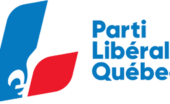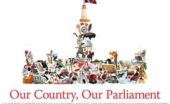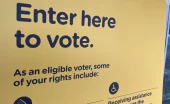Johannah Bernstein post: "eternally proud of my father’s extraordinary aeronautical engineering. legacy. here is a photo of the Canadair Water…
Jean Charest’s actions speak louder than words
Written by Diana Thebaud Nicholson // August 24, 2012 // Québec // Comments Off on Jean Charest’s actions speak louder than words
By Don Macpherson, Montreal Gazette August 24, 2012
MONTREAL – In his interview with The Gazette on Thursday, Jean Charest offered an original explanation for what he called the “perception” by English-speaking voters that he takes their support for granted.
As long as the Parti Québécois exists, the Liberal leader said, Quebec politics will be dominated by debate over sovereignty and a referendum. And that debate takes place within the French-speaking community, not the English-speaking one. That’s why English-speaking voters feel their concerns are ignored.
As he has repeatedly during the campaign for the Sept. 4 Quebec election, Charest assured English-speaking voters that he doesn’t take their support for granted.
But his words are contradicted by his actions and those of his party during its last term in office. Charest has been willing to go farther than any other premier, including PQ ones, to weaken the legal protection for minority rights, including language rights.
In October 2009, the Supreme Court of Canada struck down a Quebec law that prevented parents from making their children eligible to attend English schools under Bill 101 by sending them to private English schools first for as little as a year.
In its bill responding to the so-called “bridging” schools decision, Charest’s government became the first to propose to amend the Quebec charter of rights to restrict protection for rights and freedoms instead of expanding it.
The bill would have introduced an interpretive clause weakening the charter’s protection against discrimination, particularly on grounds of language, in the private sector as well as the public. It would have done so by directing courts interpreting the charter to take into account “both the fact that French is the official language of Quebec and the importance of ensuring its perpetuity.”
As it turned out, the proposal wasn’t adopted. But the simple fact that it was put forward showed that Charest was prepared to sacrifice minority rights if necessary to appease nationalists.
When the Supreme Court handed down its decision, the chairs of the two English school boards most affected by it sought a meeting with Charest to discuss the government’s response. The chairs of the two largest English school boards are arguably the leading elected representatives of the English-speaking community.
But it wasn’t until nearly eight months after they sent their initial letter seeking a meeting, and after they had sent a second letter, that they received a reply. It said their request had been passed down to the education minister, whom they’d already met.
At least that education minister, Michelle Courchesne, could speak English. For much of Charest’s last term, the portfolio was held by Line Beauchamp, the first Liberal education minister unable to speak the language.
The school-board chairs aren’t the only English-community representatives Charest has snubbed. Despite repeated invitations to him, the leadership of the Quebec Community Groups Network, a provincewide anglophone umbrella group, hasn’t met with him since 2003. And as of Thursday, the QCGN had not received a response from Charest to its open letter to the party leaders asking for their positions on issues of concern to the English-speaking community. (The other party leaders haven’t replied either, but they don’t enjoy nearly the support in the English-speaking community that Charest’s Liberals do.)
In the current campaign, Charest has often warned English-speaking voters that François Legault, leader of the Coalition Avenir Québec, wants to “dismantle” English school boards. (Legault proposes to abolish all boards, French as well as English.)
Yet Charest’s own government wanted to weaken the school boards by reducing their powers and budgets, until it was forced to back down by English-speaking delegates at the last Liberal policy convention.
While anglophones make up 11 per cent of the population of Quebec, there are only four members of the English-speaking community among the 125 Liberal candidates in the current election campaign. This means anglophones will be under-represented in the next Liberal caucus.
Charest assured The Gazette that the English-speaking members of his caucus have “total freedom” to speak out in defence of the English-speaking community.
It’s just that they never do.
And the Liberal platform contains no commitments to the English-speaking community in particular.
While Charest makes promises to other voters about what the Liberals will do for them, to anglophones he makes only threats about what the other parties will do to them.
Charest says he doesn’t take the English-speaking community for granted. But his actions continue to speak louder than his words.
dm*********@*************te.com



